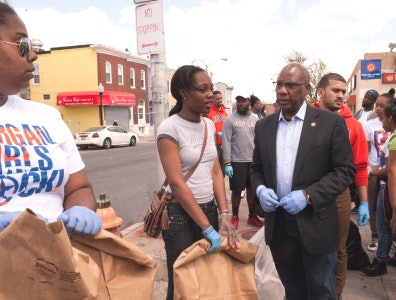 Morgan State President David A. Wilson joins with students in community cleanup efforts in the wake of Freddie Gray’s death. Wilson said Morgan State has a responsibility to help solve the issues of the community.
Morgan State President David A. Wilson joins with students in community cleanup efforts in the wake of Freddie Gray’s death. Wilson said Morgan State has a responsibility to help solve the issues of the community.The state of Maryland recently issued the nation’s first formal guidelines against racial profiling, an announcement that came four days after Morgan State University announced the launch of a new task force aimed at addressing some of the city’s most pressing issues, including public safety.
The new state guidelines, which were unveiled August 25 by Attorney General Brian Frosh, were created in response to what is now being recognized as a national problem with police-community relationships — a conclusion that is due in no small part to Baltimore’s own state of affairs, which were thrust in the national spotlight following the death of Freddie Gray in April.
Frosh said that he hopes the new policies will begin to repair the “frayed relationships between police and many in the community during everyday encounters.”
Dr. Maurice Taylor, Morgan State’s vice president for academic outreach and engagement and the chair of the new “Gray” Days, Brighter Tomorrows task force, said the new police mandate is a “positive first step,” but he contends that accountability will be key.
Saying such a policy is “long overdue,” Taylor went on to say, “what matters most is whether Maryland’s newly minted laws against profiling will make a difference in how police interact with minorities in Maryland and whether under the new rules there are public consequences for police who are found to have engaged in the arbitrary profiling of races and minorities based when conducting routine patrols or other activity not related to a specific crime or criminal organization.”
The task force Taylor is now chairing will focus primarily on the issues of policing and poverty in Baltimore, he said, though the group — comprised of Morgan students, faculty and administrators — will also examine other “systemic urban challenges,” including education, public health, unemployment and more.
Morgan State President David A. Wilson said the institution has a responsibility to dedicate its intellectual resources to the improvement of the community in which it dwells.
“Morgan State University is not going anywhere,” said Wilson, “and we have to take very seriously our role as an anchor institution in this city.”
“Morgan has to be poised to be the credible institution in bringing forward solutions [to the problems in the city] that we think will work,” and the way to do that, Wilson said, is by making sure the institution “is bringing good, solid research on some of the problems that we are seeing in our community.”
Taylor elaborated on those problems, citing an April study out of Harvard that reported that Baltimore has the lowest mobility out of poverty, particularly for young Black boys, in the country. (See: “Baltimore Stands in Stark Contrast to Charleston,” June 10, 2015.) He also referenced a September 2014 investigative report by the Baltimore Sun that found the city had paid roughly $5.7 million to settle lawsuits against police officers cited for using excessive force.
“The new laws against profiling and which limit situations under which law enforcement can consider race, ethnicity, religion or sexual orientation during routine interactions with the public, could [help], but only if enforced by public consequences [to] reduce the number of such police brutality cases paid for by the city,” Taylor said.
But Taylor wonders if the new policies might be a Band-Aid on a bigger issue.
“The state’s regulations against arbitrary profiling were not meant to address perhaps the fundamental underlying problem leading to ‘Gray’ Days in Baltimore, which is the loss of manufacturing job opportunities for unskilled and semi-skilled laborers due to the closure or movement of companies formerly located in or near the city,” he said. “In 1970, about a third of the labor force in and around Baltimore was employed in manufacturing; just 30 years later only 7 percent of city’s labor force was employed in manufacturing jobs.
“Maryland’s new laws requiring polite policing are important and may be necessary but they are no substitute for for the good manners that come from having a good-paying job,” added Taylor.
Wilson believes that, in addition to being the state’s premier urban research university, Morgan State’s reputation with city, state and federal leaders make the university well poised to present solutions to some of the problems facing the city.
“I think that [local and national legislators] see us as an up-and-comer, if you will, with a lot of potential to help this city and help this state and help this nation with its goals,” he said.
And that reputation was not lost on current or prospective students in the months following Freddie Gray’s death. Wilson said that, despite initial concerns about the safety of the school environment, the school is seeing “one of the largest freshman classes that we’ve seen in years” with the fall 2015 semester, an increase of roughly 10 percent over last year, for a rough total of 1,200 new students this semester. Overall, Wilson said, there has been an increase of about 3 percent, putting Morgan State’s total enrollment for the 2015-16 school year at roughly 8,000 students ― students who will not only lend their intellectual abilities to the school’s mission but who will continue in the “great tradition at Morgan of peaceful protests” and activism around social justice issues.
“We’re committed to this effort for the long haul, and that’s what it’s going to take to address some of these issues” facing Baltimore and the state ― and nation ― overall, Wilson said.





















